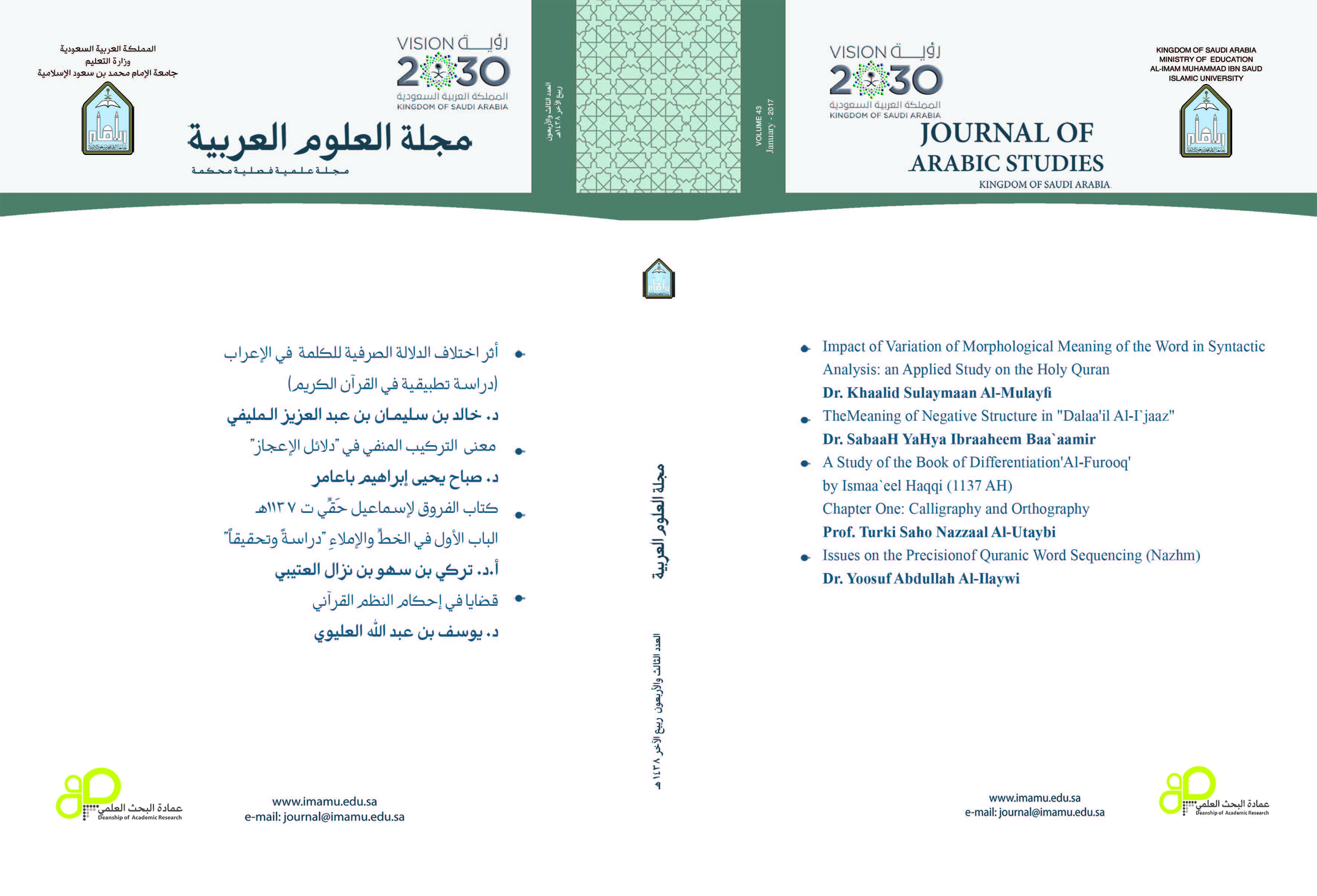قضايا في إحكام النظم القرآني
الملخص
إحكام النظم أساس منهجيّ لدراسة بلاغة القرآن الكريم، وفي ضوء ذلك يناقش البحث خمس قضايا هي:
1- أثر السياق الكلي في تحليل النظم القرآني. 2- دراسة تناسب النظم القرآني حسب ترتيب النزول. 3- دعوى الفراغات في النص القرآني. 4- موقع اسم السورة من النظم القرآني.
5- التفاضل في بلاغة النظم القرآني. 5- ومن النتائج التي توصل إليها بعد تأصيلٍ وتقويمٍ ومناقشةٍ ونقدٍ ما يأتي:
1- أظهرت دراسات التناسب نضجًا ظاهرًا في التناول الكلي (النصّي) لنظم السورة، استوعب جميع أجزائها في ضوء مقاصد الخطاب وسياق النظم.وتعد هذه الدراسات سابقة للدراسات النصية الحديثة في التنظير والتطبيق. 2- تطبيق بعض معايير الدراسات النصية الحديثة على القرآن العظيم فيه إشكالات منهجية مع خصوصية النظم القرآني وقدسيته، كما في القبول والتناص مثلاً. 3- يترتب على وحدة النظم القرآني وتعالق بعضه ببعض أن تحليل أي تعبير منه وتوجيه أساليبه يكون في سياق النظم الكلي للمقطع وللسورة، ولا يكتفى بالنظر إلى جزء مقتطع من النظم دون سياقه الكلي. 4- السياق اللغوي (النصّي) مع أهميته لا يكفي في تحليل بلاغة النظم القرآني وبيان دلالاته، فثمة مرجعيات أخرى معتبرة، كالأثر وأسباب النزول وأحواله وإجماع المفسرين من السلف. 5- إعادة ترتيب الآيات أو السور حسب نزولها ينقض القول بالتناسب والترابط اللفظي والمعنوي بين آيات القرآن، وكذلك بين سوره. 6-إسقاط مقولة "فجوات النص" كما هي عند اتجاهات التلقي والتفكيكية على النظم القرآني نقض لإحكامه وإبطال لدلالاته ومقاصده؛ لأن النص القرآني بهذا المنطق نص مفكك غير متماسك ولا مترابط ولا كامل، والقارئ يستدرك عليه بملء فراغاته؛ ليرممه ويكمله ويحكم نظمه. 7- أسماء السور ليست من القرآن؛ فلا يتجه نظر البلاغي إلى تحليل اسم السورة باعتباره مفردة قرآنية وجزءًا من بنية السورة ونظمها.أما دراسة الأسماء دراسة مستقلة عن نظم السور وتحليل بنيتها ودلالتها فإنه لا يخلو من فائدة، لكنه لا يعد من دراسة بنية النظم القرآني. 8- إذا كان مدار البلاغة على مراعاة مقتضيات الأحوال، وكان التفاضل بين الناس في البلاغة يقع بسبب قصورهم في إدراك الأحوال؛ فإن القرآن العظيم لا يقع فيه التفاضل في بلاغته؛ لأن الله جل جلاله عليم خبير، ويقع كلامه تعالى على الغاية في مطابقة مقتضى الحال.
ويوصي الباحث بعدُ بما يأتي:
1- الحذر من الاستعجال في تطبيق المناهج النصية الحديثة على النظم القرآني الكريم؛ لما تحويه تلك المناهج من إشكالات منهجية تتعارض مع خصوصية النظم القرآني وقدسيته. 2-تقويم الدراسات النصيّة الحديثة التي طبقت مناهجها على النظم القرآني؛ لنقدها وبيان إشكالاتها، وللنظر فيما يمكن للمنهج البلاغي أن يستفيده من أدواتها. 3- بذل المزيد من الدراسات المعمقة لتطوير المنهج البلاغي في دراسة السورة القرآنية دراسة كليّة (نصيّة)، بالإفادة من المنجزات الواسعة والعميقة للدراسات التناسبية، ومن آليات الدراسات النصيّة الحديثة التي لا تتعارض مع النظم القرآني.
والحمد لله رب العالمين.




